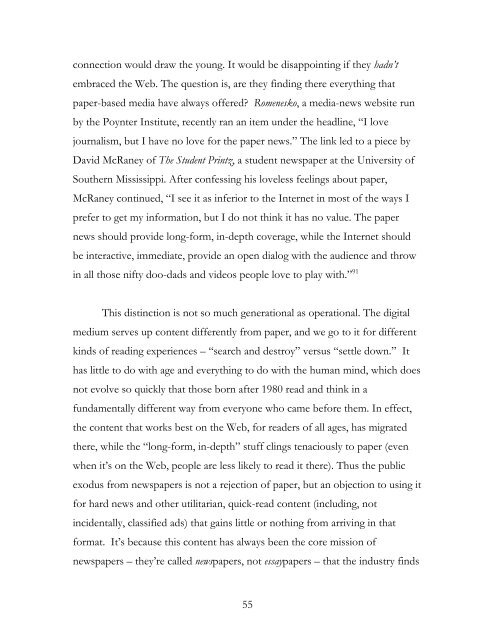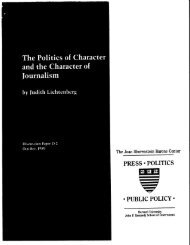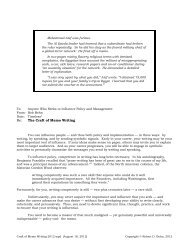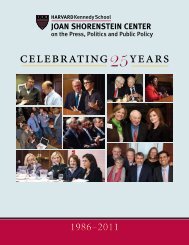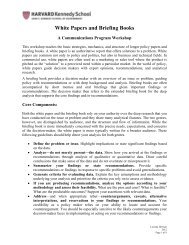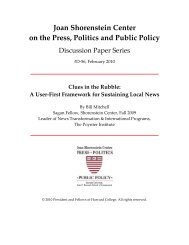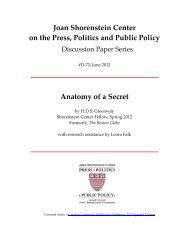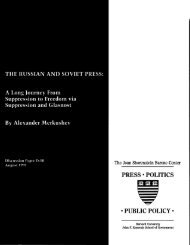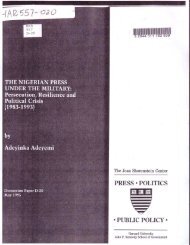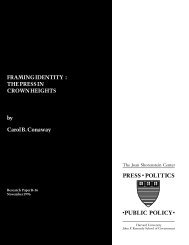Why Paper Is Eternal - Joan Shorenstein Center on the Press ...
Why Paper Is Eternal - Joan Shorenstein Center on the Press ...
Why Paper Is Eternal - Joan Shorenstein Center on the Press ...
Create successful ePaper yourself
Turn your PDF publications into a flip-book with our unique Google optimized e-Paper software.
c<strong>on</strong>necti<strong>on</strong> would draw <strong>the</strong> young. It would be disappointing if <strong>the</strong>y hadn’t<br />
embraced <strong>the</strong> Web. The questi<strong>on</strong> is, are <strong>the</strong>y finding <strong>the</strong>re everything that<br />
paper-based media have always offered? Romenesko, a media-news website run<br />
by <strong>the</strong> Poynter Institute, recently ran an item under <strong>the</strong> headline, “I love<br />
journalism, but I have no love for <strong>the</strong> paper news.” The link led to a piece by<br />
David McRaney of The Student Printz, a student newspaper at <strong>the</strong> University of<br />
Sou<strong>the</strong>rn Mississippi. After c<strong>on</strong>fessing his loveless feelings about paper,<br />
McRaney c<strong>on</strong>tinued, “I see it as inferior to <strong>the</strong> Internet in most of <strong>the</strong> ways I<br />
prefer to get my informati<strong>on</strong>, but I do not think it has no value. The paper<br />
news should provide l<strong>on</strong>g-form, in-depth coverage, while <strong>the</strong> Internet should<br />
be interactive, immediate, provide an open dialog with <strong>the</strong> audience and throw<br />
in all those nifty doo-dads and videos people love to play with.” 91<br />
This distincti<strong>on</strong> is not so much generati<strong>on</strong>al as operati<strong>on</strong>al. The digital<br />
medium serves up c<strong>on</strong>tent differently from paper, and we go to it for different<br />
kinds of reading experiences – “search and destroy” versus “settle down.” It<br />
has little to do with age and everything to do with <strong>the</strong> human mind, which does<br />
not evolve so quickly that those born after 1980 read and think in a<br />
fundamentally different way from every<strong>on</strong>e who came before <strong>the</strong>m. In effect,<br />
<strong>the</strong> c<strong>on</strong>tent that works best <strong>on</strong> <strong>the</strong> Web, for readers of all ages, has migrated<br />
<strong>the</strong>re, while <strong>the</strong> “l<strong>on</strong>g-form, in-depth” stuff clings tenaciously to paper (even<br />
when it’s <strong>on</strong> <strong>the</strong> Web, people are less likely to read it <strong>the</strong>re). Thus <strong>the</strong> public<br />
exodus from newspapers is not a rejecti<strong>on</strong> of paper, but an objecti<strong>on</strong> to using it<br />
for hard news and o<strong>the</strong>r utilitarian, quick-read c<strong>on</strong>tent (including, not<br />
incidentally, classified ads) that gains little or nothing from arriving in that<br />
format. It’s because this c<strong>on</strong>tent has always been <strong>the</strong> core missi<strong>on</strong> of<br />
newspapers – <strong>the</strong>y’re called newspapers, not essaypapers – that <strong>the</strong> industry finds<br />
55


